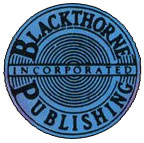Original series- Adventures in the Mystwood, 1 issue
- Alien Ducklings, 4 issues
- Alien Worlds graphic novel
- Atomic Man Comics, 3 issues
- Blackthorne's 3-in-1, 2 issues
- Brik Hauss, 1 issue
- Cold Blooded Chameleon Commandos, 5 issues
- Crow of the Bear Clan, 6 issues
- Danse, 1 issue
- Dogaroo, 1 issue
- Duckbots, 2 issues
- Enchanted Valley, 2 issues
- Failed Universe, 1 issue – New Universe parody
- Figments, 3 issues
- Fragments (Black), 2 issues
- Freak-Out on Infant Earths, 2 issues – Crisis on Infinite Earths parody
- The Gift, 1 issue
- Ground Pound! Comix , 1 issue
- Hamster Vice, 6 issues – Miami Vice parody
- Jack Hunter (Vol. 1, color), 1 issue
- Jack Hunter (Vol. 11, Prestige format B&W), 3 issues
- Jax and the Hellhound , 3 issues
- Labor Force, 8 issues
- Lann graphic novel
- Laffin' Gas, 12 issues
- Legion Of Stupid Heroes, 1 issue – Legion of Super-Heroes parody
- Mad Dog Magazine, 3 issues
- The Man of Rust, 1 issue
- Midnite, 3 issues
- Mr. Cream Puff, 1 issue
- Nervous Rex, 10 issues
- Of Myths and Men, 2 issues
- Omega Elite, 1 issue
- Omni Men, 1 issue
- Operative: Scorpio graphic novel
- Outposts, 1 issue
- Pajama Chronicles, 1 issue
- Planet Comics, 3 issues
- Possibleman, 2 issues
- Pre-Teen Dirty-Gene Kung Fu Kangaroos, 3 issues – Teenage Mutant Ninja Turtles parody
- Red Heat, 2 issues
- Revolving Doors, 3 issues
- Roachmill , 6 issues
- Rivit, 1 issue
- Serius Bounty Hunter, 3 issues
- Shuriken graphic novel
- Starlight Squadron, 1 issue
- Street Poet Ray, 2 issues
- Street Wolf, 3 issues
- To Die For, 1 issue
- Timeline Color Comics, 1 issue (?)
- Tracker, 2 issues
- Twisted Tantrums of the Purple Snit, 2 issues
- Wings Comics graphic novel
- Wolph, 1 issue
- Xeno-Men, 1 issue
- X-L, graphic novel
| Blackthorne 3-D Series80 issues - 3-D Bullwinkle & Rocky, 1 issue
- 3-D Bullwinkle For President In 3-D, 1 issue
- 3-D Heroes, 1 issue
- 3-D Sports Hall of Shame, 1 issue
- Adventures of Capt. Holo 3-D, 1 issue
- Baby Huey 3-D, 1 issue
- BattleTech 3-D, 1 issue
- Betty Boop 3-D, 1 issue
- Bizarre 3-D Zone, 1 issue
- Bozo the Clown in 3-D, 3 issues
- Bravestarr in 3-D, 2 issues
- California Raisins in 3-D, 5 issues
- California Raisins: The Ultimate Collection trade paperback
- Casper in 3-D, 1 issue
- Classic Jungle Comics, 1 issue
- Dick Tracy in 3-D, 1 issue
- The Flintstones in 3-D, 4 issues
- G.I. Joe in 3-D, 6 issues
- G.I. Joe in 3-D Annual, 1 issue
- Goldyn in 3-D, 1 issue
- Gumby 3-D, 7 issues
- Hamster Vice in 3-D, 2 issues
- Kull 3-D, 2 issues
- Lars of Mars in 3-D, 1 issue
- Laurel & Hardy in 3-D, 2 issues
- Little Dot 3-D, 1 issue
- Little Nemo in Slumberland 3-D, 1 issue
- Merlin Realm in 3-D, 1 issue
- Moonwalker in 3-D, 1 issue
- The Noid in 3-D, 2 issues
- Playful Little Audrey in 3-D, 1 issue
- Rambo III 3-D, 1 issue
- Red Sonja 3-D, 1 issue
- Richie Rich and Casper 3-D, 1 issue
- Sad Sack 3-D, 1 issue
- Salimba 3-D, 2 issues
- Sheena 3-D Special, 1 issue
- Solomon Kane 3-D, 1 issue
- Star Wars 3-D, 3 issues
- Transformers in 3-D, 3 issues
- To Die For 3-D, 1 issue
- Twisted Tales 3-D, 1 issue
- Underdog 3-D, 1 issue
- Waxwork 3-D, 1 issue
- Wendy in 3-D, 1 issue
- Werewolf 3-D, 1 issue
| Licensed and reprint titles- Battle Beasts , 4 Issues
- BattleForce, 2 issues
- BattleTech , 6 issues
- BattleTech Annual
- Beyond Mars , 5 issues (later released as two-part trade paperback)
- Comic Strip Preserves series
- Dick Tracy series
- Dick Tracy Book, 21 issues
- Dick Tracy (Reuben series), 24 issues
- Dick Tracy Monthly/Weekly, 99 issues
- Dick Tracy Special, 3 issues
- Dick Tracy: The Early Years, 4 issues
- Dick Tracy: The Unprinted Stories, 4 issues
- Dick Tracy trade paperback
- The Iger Comics Kingdom trade paperback
- Jerry Iger's Classic Jumbo Comics, 1 issue
- Jerry Iger's Golden Features, 7 issues
- Jerry Iger's National Comics trade paperback
- Jungle Comics, 4 issues
- Kerry Drake , 5 issues
- Kirby: King of the Serials, 1 issue
- Little Nemo in Slumberland , 2 issues
- Li'l Abner (Reuben Series) trade paperback
- Official How to Draw series
- On Stage by Leonard Starr trade paperback
- Prince Valiant graphic novel, 2 issues
- Rambo , 1 issue
- Rambo III , 1 issue
- Rover from Gasoline Alley , 1 issue
- Salimba graphic novel
- Star Hawks , 4 issues
- Stories of the West, 2 issues
- Tales of the Jackalope, 7 issues
- Tarzan , 1 issue
- Waxwork , 1 issue
- Werewolf , 5 issues
|
